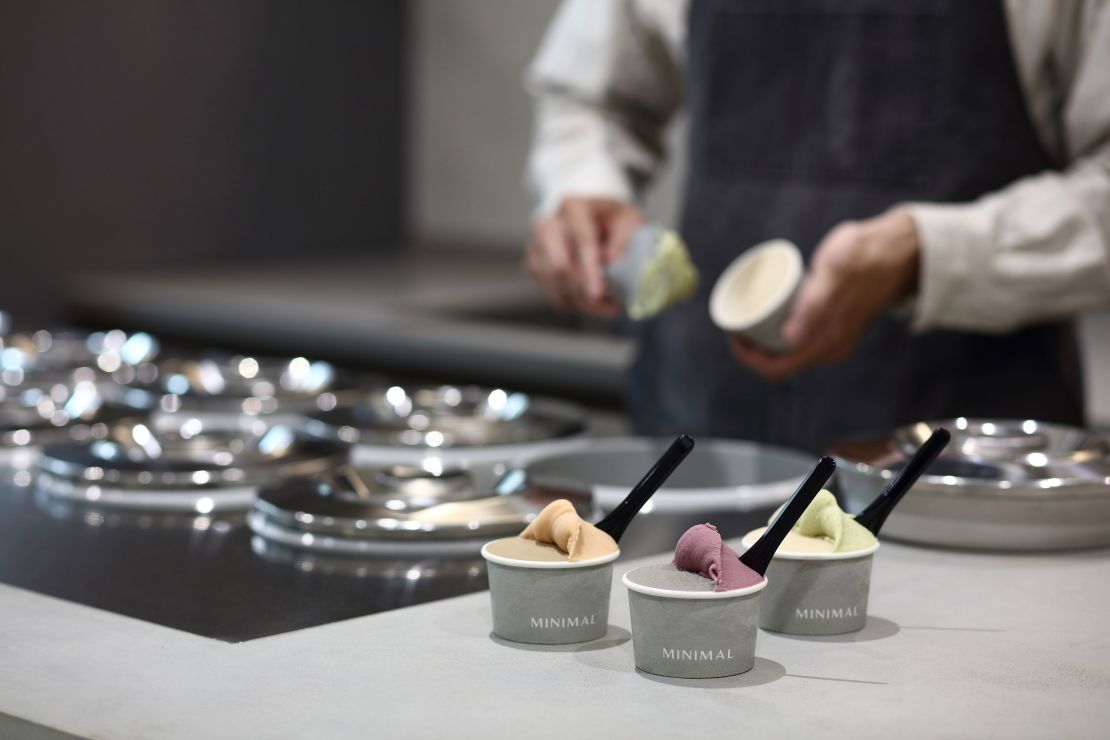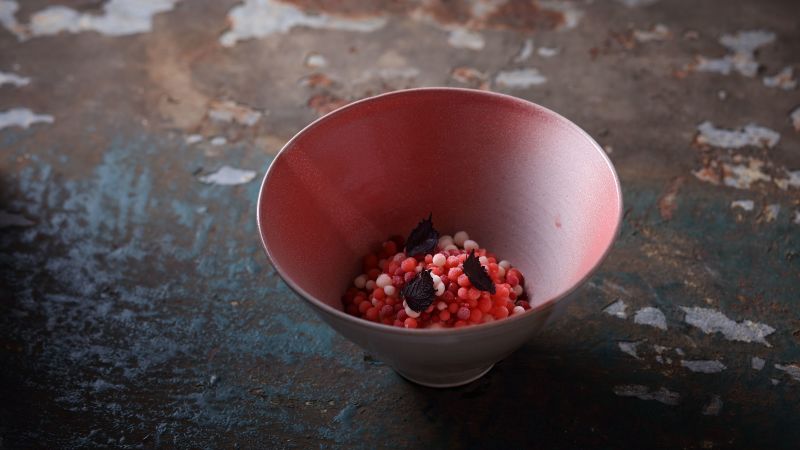Editor’s Note: This CNN Travel series is, or was, sponsored by the country it highlights. CNN retains full editorial control over subject matter, reporting and frequency of the articles and videos within the sponsorship, in compliance with our policy.
Taiwan’s growth as a fine dining destination shows no signs of slowing, as evidenced by the island’s latest Michelin Guide.
Ten new establishments received stars in the 2024 edition – taking the total number of Michelin-starred restaurants on the island to 49.
But one of them in particular really stands out.
Minimal, in the city of Taichung, is the world’s first and only ice cream establishment to receive a Michelin star.
Set in an alley next to the city’s tree-lined Calligraphy Greenway boulevard, its spartan gray and dark charcoal façade makes it look more like a Nordic architecture firm than a dessert shop.
The two-story venue has both a takeaway outlet and a dine-in section that offers a seven-course tasting menu.
“Focusing on ice and ice cream, the restaurant skillfully layers flavors and textures through temperature variations and creative combinations, using unique local ingredients from Taiwan,” says the Michelin Guide’s write-up of Minimal.
“The meticulous flavors, delicacy and mature, skilful techniques all impressed us and reached a higher level, warranting a Michelin star.”
Arvin Wan, Minimal’s soft-spoken founder, has been obsessed with ice ever since he was a child.
“My family had a double-door refrigerator with an installed ice-maker. I’d eat ice cubes every day,” he recalls.
Fascinated by the thrilling sensation of an ice cube hitting his tongue, the slight sweetness of the filtered water revealing itself as it melted, young Wan began to experiment by putting different foods into the freezer.
It wasn’t until years later that he turned his passion into a profession.
“I grew up in a single-parent household,” says Wan.
“After graduating from culinary school, I worked as a chef when my mother was battling cancer. The two shifts in the kitchen meant very long working hours. Every morning, I could see my mother for a short while before heading to work, and she was already asleep by the time I got home.
“Before her passing, I didn’t spend much time with her. (After that) I reflected a lot — if I continued on my current path, I wouldn’t have time for people I cherish in the future.”
So, he quit his job in the kitchen to return to something that brought him joy as a child. In 2014, he started working in an ice cream parlor.
It was a short experience. In 2016, Wan accepted his friends’ invitation to co-found Sur-, a contemporary Taiwanese restaurant in Taichung that earned its first Michelin star in 2021.
Wan worked as the restaurant’s head pastry chef, but left in 2019 to return to his true passion — ice.
“Desserts often aren’t the most important part of a meal in a restaurant,” he says. “They’re more like a finish, a supporting act.
“I really only love ice. I don’t feel the same way about other desserts. So I just wanted to make ice but that isn’t possible from a restaurant’s perspective — you can’t just serve ice as dessert all year.”
The restaurant experience gave Wan some much-needed clarity. One thing was certain — he needed to build his own ice cream shop, a move his colleagues at Sur- fully supported.
In 2021, Minimal opened its doors.
The name refers to the nominal number of elements in ice cream — from sugars to proteins — that create its smooth texture, as well as the aesthetic style.
“Minimalist design may look very simple, but it’s extremely complex if you understand it,” says Wan.
“Similar to ice cream, it goes through a very complex calculation and planning process to obtain such a state and taste.”

On the ground floor is a takeaway ice cream shop offering six whimsical flavors that are continuously updated. Recent options include biluochun (a type of green tea) with sugarcane and an herb called Angelica morii, as well as pine needles with Camellia seed oil and green Taiwanese herbs.
The 20-seater restaurant on the second floor serves a seven-course set menu that plays with food at different, mostly sub-zero, temperatures. The structure of the menu changes little throughout the year but the ingredients and themes shift according to seasons.
Each dish is named after the temperature it’s served at, and the current menu begins with a half-molten starter, the 0°C Loquat/Pear (32 Fahrenheit). Then, diners will have the only hot course in the meal — a rice dumpling sandwiched between two crispy pancakes, titled 180°C Rice/Edamame.
The experience continues with the -40°C Wild Ginger Flowers/Sake ice lollipop, the -5°C Whisky/Pineapple/Magnolia shaved ice dish, the -12°C Snakeweed/Perilla/Anise ice cream/gelato course and then the very chilly -196°C Strawberry/Roselle/Cream, a liquid nitrogen/ice crystals dish.
Wrapping up the meal is a 40°C pastry dessert served with a side of longan/osmanthus gelato.
Creating these unique dishes and running an ice cream-themed “restaurant” takes lots of planning and experimenting. There’s far more to it than just churning ingredients in a Pacojet ice cream maker.
“Most people are less familiar with temperatures below zero and think they’re all the same. I hope to find a way to understand the differences,” says Wan.
The -40°C lollipop, for example, has a crunchy texture that melts much slower than normal ice and dissipates like a piece of fluffy cotton candy when eaten. (Ice cubes in household freezers are usually chilled to -18 Celsius.) To create this sensation, Wan essentially needed to find a way to inject more air into the lollipop.
“I had to make the mixture a little bit thicker so that it could coagulate the air bubbles,” he says. “Then, at the same time, I had to create a valve, so that gas can enter the liquid and not exit before it is frozen.”
Wan often experiments with his ideas at different temperatures when drafting his menu. To achieve this, Minimal’s kitchen is fitted with many fridges, with varied settings. Some are slightly colder than serving temperatures, giving his team time to plate and explain the dish to guests before it’s sampled.
Getting tastes and smells just right can also be a challenge.
“Most ice doesn’t have a lot of aroma because fragrance is very inactive below zero,” he says.
“To overcome that, I have to complement it with some other ingredients to create a more complex nose and taste that reminds you of the theme of the dessert.”
For example, he adds mint and Angelica morii to his biluochun green tea ice cream, hoping that the extra layers of grassy tastes will offset the decrease in green tea flavor.
Despite becoming a connoisseur, Wan says he’s far from picky when it comes to ice cream.
“I still eat ice cream almost every day. Most of the time, I eat really cheap ice treats like qing bing (a retro dessert made of water and banana flavoring served as shaved ice or in popsicle form). They’re a no-brainer for me,” says Wan.
Growing up, the Minimal founder says his mother encouraged him to follow his passions instead of focusing on monetary success, and he hopes to help others find their happiness through his dishes.
“When we were young, most of us loved eating iced desserts. As we grow older, the prospect of eating ice is much less exhilarating – the ice itself hasn’t changed, but the feeling towards it has changed — it’s no longer new and special,” he says.
“I hope that with Minimal, grown-ups can rediscover the joy of eating ice again – as if it was their first ice cream experience.”
Minimal, No. 16, Lane 133, Section 1, Meicun Rd, West District, Taichung City, Taiwan; +886 4 2321 9080
Read the full article here


